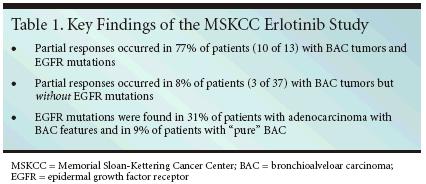Studies Analyze EGFR and K-ras Mutations in Bronchioalveolar Carcinoma
This supplement to Oncology News International includes more than 15 reportson presentations made at the 41st annual meeting of the American Society of Clinical Oncology.Reviews focus on the use of targeted agents in non–small-cell lung cancer and other solid tumors,evaluating the novel therapies bevacizumab, cetuximab, bortezomib, erlotinib, and gefitinib, aloneand/or in combination with other chemotherapy agents. Continuing medical education credit isavailable by completing a post-test and evaluation online at www.cancernetwork.com/cme.
ORLANDO-In patients withbronchioalveolar carcinoma (BAC),are epidermal growth factor receptor(EGFR) and K-ras mutations associatedwith response to treatment withtyrosine kinase inhibitors (TKIs) likegefitinib (Iressa) and erlotinib (Tarceva)?The answer to this question variedin three different studies.Bronchioalveolar carcinoma is atype of lung cancer with unique featuresthat is increasing in incidence,said Fred R. Hirsch, MD, PhD, professorof medicine and pathology at theUniversity of Colorado Cancer Centerin Aurora, and the principal investigatorof one of the three studies. It ismore frequent among women andnonsmokers. While pure BAC is notcommon, occurring in just 2% to 3%of patients, many lung cancers haveBAC characteristics.Previous studies have suggested thatpatients with BAC features are morelikely to respond to TKIs. Other studieshave found that patients with nonsmall-cell lung cancer who have EGFRmutations are more likely to respondto gefitinib and erlotinib, whereas thosewith K-ras mutations are less likely torespond. The new studies are amongthe first to investigate EGFR and KRasmutations exclusively in BAC.MSKCC Erlotinib TrialEGFR mutations were more commonin adenocarcinoma with BAC featuresthan in "pure" BAC in the findingsin one study reported by MarkKris, MD, chief of the Thoracic OncologyService at Memorial Sloan-KetteringCancer Center, New York, andcolleagues (abstract 7029). In their molecularanalysis of specimens fromabout 50 patients with stage IIIb or IVBAC, they found a 9% mutation rateamong those with pure BAC vs 31%for those who had adenocarcinomawith BAC characteristics. The normalmutation rate in North America isestimated at about 10%.

In these patients, who are beingtreated with erlotinib in an ongoingphase II trial, the investigators reporteda 77% partial response rate amongthose with EGFR mutations vs 8%among those without mutations, a statisticallysignificant difference.Two SWOG Gefitinib StudiesA second study, led by Paul Gumerlock,PhD, of the University ofCalifornia, Davis, Cancer Center inSacramento (abstract 7008) analyzedtumor tissue from 67 BAC patientsenrolled in a Southwestern OncologyGroup phase II trial of gefitinib(SWOG-0126). It found EGFR mutationsin 18% of the patients. This studydid not find a statistically significantlink between EGFR mutation and responseoverall, but a subgroup of patientswith EGFR mutations and withoutK-ras mutations were significantlymore likely to respond.The third study, led by Dr. Hirsch,analyzed tissue samples from patientswith BAC from the same SWOG trialand also found no statistically significantassociation between EGFR mutationsand response (abstract 7030).This study, however, did find that ahigh number of EGFR gene copieswere significantly correlated with response(see article on amplification,page 16).Two of these studies also looked atthe association between response toTK inhibitors and mutations in the Krasgene, which plays a key role in oneof the EGFR signaling pathways.Similar to the findings by Dr. Krisand colleagues that no patients withK-ras mutations responded to erlotinib,in the SWOG cohort, Dr. Gumerlockreported that only 1 of 19patients with K-ras mutations had respondedto the drug. K-ras mutationrates in the two studies did differ, however,at 30% in the SWOG group vs13% in the other group.In discussing the differences in theEGFR findings, Manuel Hidalgo, MD,PhD, co-director of the Drug DevelopmentProgram at Johns HopkinsUniversity School of Medicine, notedthat recent reports in the literaturehave also had conflicting evidence regardingthe association between EGFRmutations and response. "I don't havean obvious explanation other than thedifferences in the studies themselvesthat limit their comparability," he said.All studies so far are relatively smalland retrospective, he noted, and patientpopulations and analytical methodshave differed.